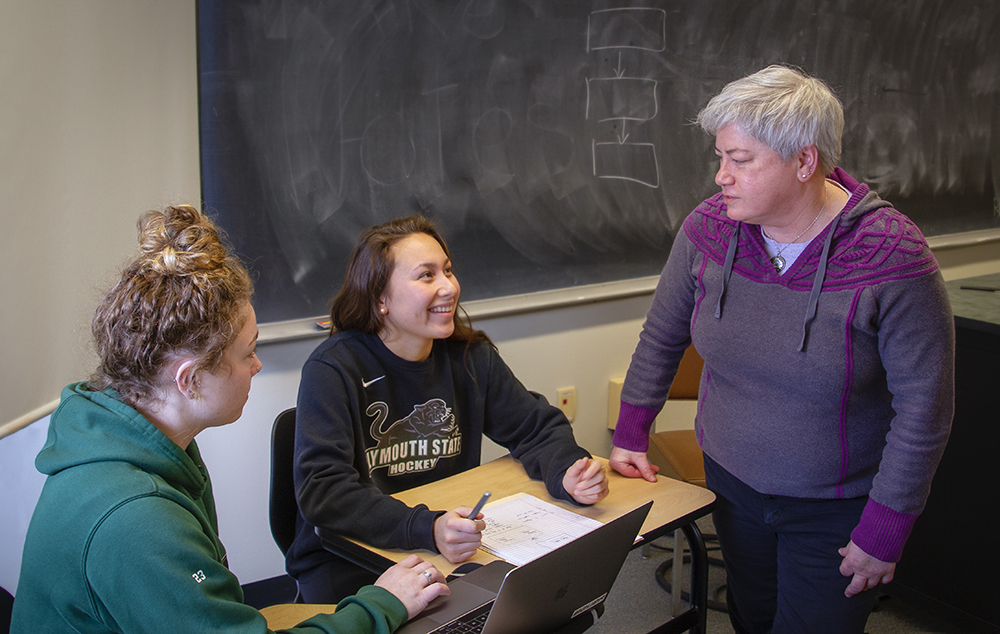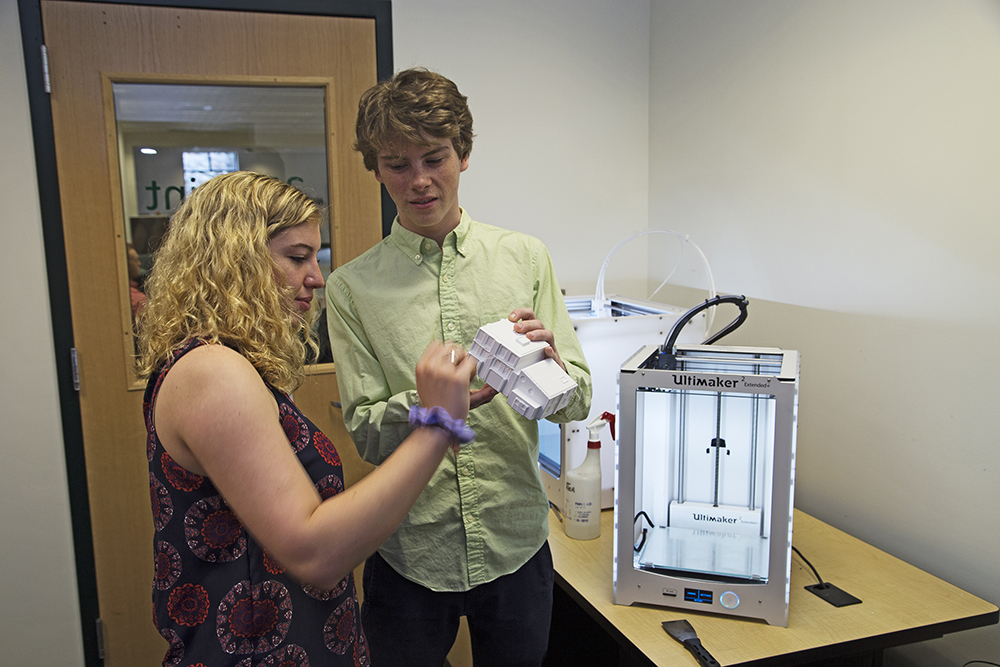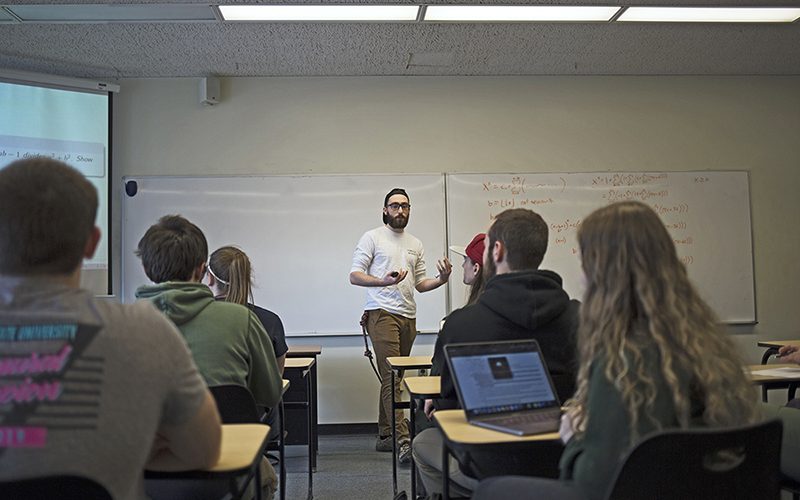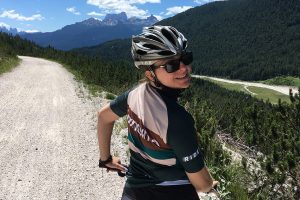We live in an age of upheaval that is questioning traditional practices, confounding accepted wisdom, and shattering longstanding industries. Whether it is Uber’s reshaping of personal transportation, online media’s erosion of print journalism, or Amazon’s streamlining of commerce, the message is clear: the old “tried and true” is frequently no longer sufficient.
Higher education is not immune to digital-age disruptions, which have been compounded by many other intersecting factors. Plymouth State University has responded with a proactive, innovative strategy—Integrated Clusters—that is transforming the entire institution. The success of the new learning model is due in part to PSU’s culture of perseverance, which has propelled the institution since its founding nearly 150 years ago.
A Heritage of Innovation and Adaptation
Plymouth State has a long tradition of meeting evolving educational needs. Established in 1871 as Plymouth Normal School, changes in foci and scope led to Plymouth Teacher’s College in 1939, Plymouth State College in 1963, and Plymouth State University in 2003.
The name changes heralded shifting priorities and enlarged areas of operation. While further renaming is not under consideration, dramatic transformations are again thoroughly reshaping the campus. What remains consistent is Plymouth’s ability to face present-day realities in order to best serve students and the community.
The institution has had to overcome major difficulties almost from its inception. Plymouth Normal School was impacted by a nationwide depression that resulted in a withdrawal of state funding, prompting a decline of 251 students to a mere 30 during the 1878–1879 academic year. Ellen Reed, the sole remaining faculty member, kept the school going until it rebounded in the 1880s with the help of a series of reforms and curricular innovations. Financial exigencies caused by the 1930s Depression hit Plymouth hard as well, resulting in faculty pay cuts and increases in per pupil costs.
The boom-and-bust cycling of economic expansion and contraction doesn’t necessarily translate into similar patterns in college enrollment, however. For example, poor economic conditions have sometimes been credited with increased enrollment as more students invest in improving their credentials, rather than immediately taking their chances in a soft job market.
America’s current economic expansion may well be on track to be the longest in the nation’s history, but it hasn’t been enough in itself to counteract the factors affecting higher education. Changes in marketplace expectations and the nature of work itself have demanded a major rethinking of the academic model, and PSU has responded with its bold and pioneering Integrated Clusters approach.
The Integrated Clusters learning model provides students with ample opportunities to make connections between ideas and disciplines, so graduates have a knowledge set that includes the ability to understand and apply information.
A Rapidly Changing Marketplace
Students today face a rapidly changing, twenty-first century marketplace in which a college degree does not necessarily equate to career security. This has been accompanied by increased costs, which can put higher education beyond the reach of many families. The consolidation and even closure of some institutions speaks to the immediacy of the issues that face higher education as a whole.
It is clear that the capacity to work across disciplinary boundaries with people and content is an essential skill in today’s marketplace, but the increased specialization of some college programs has at times run counter to this necessity. Leveraging this insight is key to Plymouth State’s current forward momentum. The Integrated Clusters learning model provides students with ample opportunities to make connections between ideas and disciplines, so graduates have a knowledge set that includes the ability to understand and apply information.
“Today, the focus in higher education must be on a knowledge-based economy and how we can create student experiences that engage them in the process—providing the excitement of learning and seeing its application to real world experiences,” says President Donald Birx.
Real-World Topics Motivates Students
The connection to real-world concerns is central to each of the “Four Tools” of Integrated Clusters, beginning with Tackling a Wicked Problem, the introduction for first-year students to Clusters. PSU’s revamped General Education Program stresses acquisition of twenty-first century “Habits of Mind” (ways of thinking or engaging with the world that include Purposeful Communication, Problem Solving, Integrated Perspective, and Self-Regulated Learning), and students gain firsthand experience working on contemporary issues in the University’s Open Laboratories. Integrated Capstone (INCAP) courses allow juniors and seniors to take even greater control of what and how they learn.
PSU is pioneering Cluster Pedagogy, which takes unique advantage of this new learning model through its emphasis on interdisciplinarity and integration built around a strong, discipline-based core; project-based work that extends beyond the walls of the classroom; and open practices that foster access to knowledge and empower students to contribute to their wider communities and networks. These components were central to the success of a new INCAP course piloted this spring by Professor Cathie LeBlanc.
“It is very different from other classes. It really incorporated the concept of self-regulated learning, and I got to learn what I thought was important.”
Allison Louie ’20
“How can we make this easier and better for these students?” was the essential question that Alison Louie ’20 and her classmates considered in their redesign of experiences for incoming students. The group analyzed e-mails, website messaging, and printed communications that are sent by several campus offices, and conducted further research and tested ideas through meetings with PSU’s admissions team.
One of the key takeaways of Plymouth State’s new direction is that students are highly motivated to work on tangible, concrete issues. “We’re talking about some of the most important issues in the times that we live in,” says Jacqueline Lee ’19 about her signature experience in an INCAP focused on sustainability. “Everything we do in this class is important and valuable.”
“It is very different from other classes,” says Louie. “It really incorporated the concept of self-regulated learning, and I got to learn what I thought was important. If I want to be successful and get a job after college I need these skills, and I’m learning them in this class. It also really helped to know that this was real. We want to make a difference and to see this grow and continue after we graduate.”
The class used Twine, an open-source software application, to create its interactive web prototype, which can be viewed along with other course materials at https://cathieleblanc.com/is4220Student/.

INCAP “signature” projects relate to problems important to both students and society. Using their personal knowledge of the stages that prospective PSU students go through, LeBlanc’s students designed an online “journey map” to facilitate the process, from application through on-boarding.
“The course teaches about the concept of resiliency, at social, community, infrastructure, and natural environment levels,” says Professor Brian Eisenhauer, who directs the Office of Sustainability. “It’s a project-based class and students decided to work with Warren, NH, up in the Baker River valley, to do a resiliency study.”
Lee and fellow students partnered with the Warren town administrator to consider flooding issues and, more broadly, the town’s sense of place. “We’re working on something with a real-world element and are able to apply what we’re learning,” she says. “We’re not just helping this town out but learning the processes that we could apply to any situation, any town, or a company.”
Clusters Energize The Entire Campus Experience
Curricular changes have been accompanied by renovating and organizing buildings to accommodate Clusters and, in particular, the Open Laboratories, where interdisciplinary groups of students are collaborating with faculty, staff, alumni, businesses, nonprofits, and other external partners. The Cluster format has also prompted significant administrative changes, producing efficiencies in roles once assigned to colleges and departments.
Plymouth State recognizes the profound influence of student experience outside of the classroom, resulting in residential life changes that support and amplify those related more directly to teaching and learning. The University’s First-Year Residential Experience (FYRE), launched in 2017–2018, is a foundational program of Clusters that emphasizes the focus on interdisciplinarity right away. Students from different majors are grouped in residence halls by their shared interests in affinity-based programs, including honors, nursing, and substance-free housing.
“Ours is not a teaching university anymore, it is a learning community and we are focused on transforming ourselves, our students, and the community, state, and nation we serve.”
President Donald Birx
Another example of the University charting its own course is in the renewal of Greek life organizations, which can be positive forces promoting service, community interactions, and school pride. The years when most fraternities and sororities were unrecognized by the University represented a missed opportunity, as the administration was unable to work with their leaders, address concerns, or promote their positive work.
PSU’s Greek life community is being revitalized upon a foundation of increased cooperation and better oversight. This year’s progress toward bringing fraternities and sororities back into the fold has yielded seven active organizations with over 140 members. “This renewed interest by students in joining leadership organizations with altruistic intents fulfills our motto of Ut prosim—That I may serve,” notes President Birx.
On Higher Education’s Leading Edge
PSU is not alone in its transformation, but the completeness of its reinvention sets the University apart from the efforts of other colleges and universities. “We are in the rare position of being able to move to the leading edge of reimagining higher education, which could have impact and ripple effects across the field and ultimately our process of discovery and learning,” says President Birx.
“Today’s students need tools as well as knowledge within their discipline to work in cross-disciplinary teams, to solve real-world problems in open environments, to experience integrated project-based learning, and have an affordable education,” he continues. “Ours is not a teaching university anymore, it is a learning community and we are focused on transforming ourselves, our students, and the community, state, and nation we serve.”

The results to date are very encouraging. Undergraduate and graduate applications, inquiries, and enrollment have increased; philanthropic giving to the University has set new records; and the number of students engaged in high-impact, collaborative experiences has ballooned to over 3,000 participants. Plymouth State University is thriving. Its reinvention of higher education is increasingly seen as a prudent investment by the state of New Hampshire and grant-making educational foundations, and there is a steady stream of inquiries from other colleges and universities hoping to learn more.
“We still have much ground to cover, but what we as a university have accomplished to date is truly astounding,” says President Birx. “It is a testament to the faculty, staff, alumni, and students of PSU that they can now say with some confidence that rethinking how we educate our students and organizing both our structure and curricula to give our students a twenty-first century education is worth the investment of time and energy.”
It’s impossible to know exactly how society and the economy will continue to evolve, but it’s a certainty that higher education must be agile in order to respond and remain relevant. Plymouth State is in the forefront of institutions engaging with today’s challenges, and a tradition of perseverance through the years strongly suggests that it will rise to meet those of the future as well.
■ Peter Lee Miller








